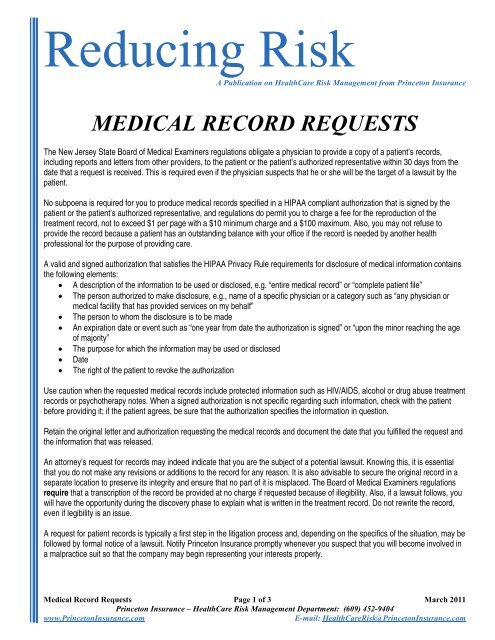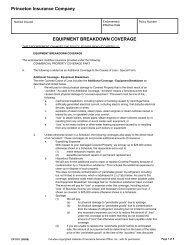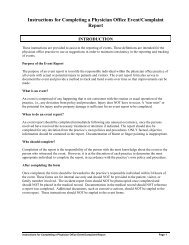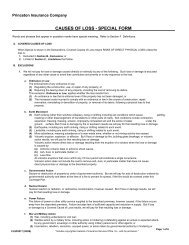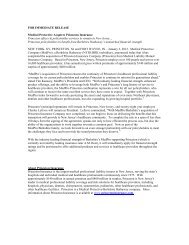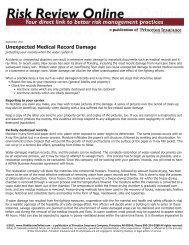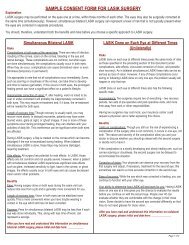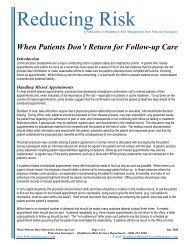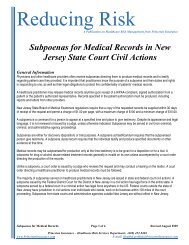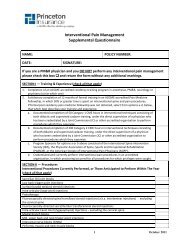medical record requests - Princeton Insurance
medical record requests - Princeton Insurance
medical record requests - Princeton Insurance
You also want an ePaper? Increase the reach of your titles
YUMPU automatically turns print PDFs into web optimized ePapers that Google loves.
Reducing RiskA Publication on HealthCare Risk Management from <strong>Princeton</strong> <strong>Insurance</strong>MEDICAL RECORD REQUESTSThe New Jersey State Board of Medical Examiners regulations obligate a physician to provide a copy of a patient’s <strong>record</strong>s,including reports and letters from other providers, to the patient or the patient’s authorized representative within 30 days from thedate that a request is received. This is required even if the physician suspects that he or she will be the target of a lawsuit by thepatient.No subpoena is required for you to produce <strong>medical</strong> <strong>record</strong>s specified in a HIPAA compliant authorization that is signed by thepatient or the patient’s authorized representative, and regulations do permit you to charge a fee for the reproduction of thetreatment <strong>record</strong>, not to exceed $1 per page with a $10 minimum charge and a $100 maximum. Also, you may not refuse toprovide the <strong>record</strong> because a patient has an outstanding balance with your office if the <strong>record</strong> is needed by another healthprofessional for the purpose of providing care.A valid and signed authorization that satisfies the HIPAA Privacy Rule requirements for disclosure of <strong>medical</strong> information containsthe following elements:• A description of the information to be used or disclosed, e.g. “entire <strong>medical</strong> <strong>record</strong>” or “complete patient file”• The person authorized to make disclosure, e.g., name of a specific physician or a category such as “any physician or<strong>medical</strong> facility that has provided services on my behalf”• The person to whom the disclosure is to be made• An expiration date or event such as “one year from date the authorization is signed” or “upon the minor reaching the ageof majority”• The purpose for which the information may be used or disclosed• Date• The right of the patient to revoke the authorizationUse caution when the requested <strong>medical</strong> <strong>record</strong>s include protected information such as HIV/AIDS, alcohol or drug abuse treatment<strong>record</strong>s or psychotherapy notes. When a signed authorization is not specific regarding such information, check with the patientbefore providing it; if the patient agrees, be sure that the authorization specifies the information in question.Retain the original letter and authorization requesting the <strong>medical</strong> <strong>record</strong>s and document the date that you fulfilled the request andthe information that was released.An attorney’s request for <strong>record</strong>s may indeed indicate that you are the subject of a potential lawsuit. Knowing this, it is essentialthat you do not make any revisions or additions to the <strong>record</strong> for any reason. It is also advisable to secure the original <strong>record</strong> in aseparate location to preserve its integrity and ensure that no part of it is misplaced. The Board of Medical Examiners regulationsrequire that a transcription of the <strong>record</strong> be provided at no charge if requested because of illegibility. Also, if a lawsuit follows, youwill have the opportunity during the discovery phase to explain what is written in the treatment <strong>record</strong>. Do not rewrite the <strong>record</strong>,even if legibility is an issue.A request for patient <strong>record</strong>s is typically a first step in the litigation process and, depending on the specifics of the situation, may befollowed by formal notice of a lawsuit. Notify <strong>Princeton</strong> <strong>Insurance</strong> promptly whenever you suspect that you will become involved ina malpractice suit so that the company may begin representing your interests properly.Medical Record Requests Page 1 of 3 March 2011<strong>Princeton</strong> <strong>Insurance</strong> – HealthCare Risk Management Department: (609) 452-9404www.<strong>Princeton</strong><strong>Insurance</strong>.comE-mail: HealthCareRisk@<strong>Princeton</strong><strong>Insurance</strong>.com
Reducing RiskSubpoenas for Medical RecordsPhysicians often receive subpoenas directing them to produce <strong>medical</strong> <strong>record</strong>s and to testify regarding patient care they provided.A subpoena ad testificandum requires the subpoenaed person to give testimony. A subpoena duces tecum requires thesubpoenaed individual to produce specified evidence such as <strong>medical</strong> <strong>record</strong>s or x-rays at the same time he or she is to testify.A Note of Caution: Despite the official language and appearance of a subpoena, do not assume that a subpoena is valid andmust be honored without question. Some attorneys disregard the court rules and attempt to improperly use a subpoena ducestecum to obtain <strong>medical</strong> <strong>record</strong>s without paying for them. A “discovery” or “<strong>record</strong>s subpoena” improperly directs a physician toproduce a copy of a patient’s <strong>record</strong>s and send them to the attorney’s office in lieu of attendance at a deposition. This practice isnot sanctioned by the courts. If you are served with such a subpoena, contact the attorney who served it and request that he orshe either provide a signed authorization from the patient, along with payment of the fee permitted by the BME regulations, or thatthe <strong>record</strong>s be produced at a deposition.Releasing a patient’s <strong>medical</strong> <strong>record</strong>s in response to an improper subpoena that is not accompanied by a signed authorizationfrom the patient may place a physician in legal and professional jeopardy for failure to protect the confidentiality of the patient’s<strong>medical</strong> <strong>record</strong>s.A valid subpoena in a civil action in the Superior Court of New Jersey (state court) must meet the following requirements:• Be served in-person by an individual at least 18-years-old• Name (on its face sheet) the court and title of the action, including the names of the parties and the court docket numberand type of action (civil, criminal, or administrative)• Be signed by either the clerk of the court or by an attorney for one of the parties in the action, or by a party to the action,and list the address and telephone number of the person who issued the subpoena• Be accompanied by payment of a witness fee and mileage• Direct properly when and where the witness is to appear:♦ Trial – anywhere in New Jersey♦ Deposition – the county in which the witness lives, works, or does business - at least ten days notice is requiredfor a deposition♦ State agency – anywhere in New Jersey consistent with the agency’s powerTo protect both yourself and your patient, if you are served with a subpoena or court order regarding a patient, consider thefollowing:• Designate an individual in your office who is responsible for handling attorney and other legal <strong>requests</strong> for patient <strong>record</strong>s.• If you have any questions or concerns about a request for patient <strong>record</strong>s, consult <strong>Princeton</strong> <strong>Insurance</strong> or an attorneyfamiliar with healthcare law.• Keep <strong>record</strong>s of all authorized disclosures of patient-protected health information for a minimum of six years.• Be aware of specific kinds of patient information that are subject to federal and state laws restricting or prohibitingdisclosure such as HIV/AIDS, drug and alcohol treatment, and mental health <strong>record</strong>s.Court OrdersA court order, unlike a subpoena, is issued by a judge who reviews the request and may conduct a hearing on the matter. A courtorder directing a healthcare practitioner to produce <strong>medical</strong> <strong>record</strong>s must be followed. However, it is still advisable that you seekexpert advice from an attorney familiar with healthcare law or from <strong>Princeton</strong> <strong>Insurance</strong> if you are served with a court order forpatient <strong>record</strong>s.Release of Original X-RaysX-rays are an integral part of a patient’s <strong>medical</strong> <strong>record</strong> and often form the basis upon which accurate diagnoses and treatment arerendered.Medical Record Requests Page 2 of 3 March 2011
Reducing RiskMeasures to secure and maintain x-rays should be given the same priority as the security and retention of <strong>medical</strong> <strong>record</strong>s, notonly from the stand point of good patient care, but also for the adequate defense of a malpractice claim and possible allegations of<strong>record</strong>s tampering.Many physicians release original x-rays due to the financial and/or logistical difficulty of providing copies.From a risk management standpoint, the safest practice is to provide copies of all x-rays and retain original films.However, it is sometimes necessary and/or mandatory for original x-rays to be released. When that is the case, the followingsuggestions should be considered in establishing an effective tracking system:• Both the film itself and the jacket in which it is stored should be labeled with the patient’s name or some other identifier.The patient’s name should be compared with the name on the film jacket prior to filing the x-rays.• When original films are released, a patient authorization form releasing the films should be obtained. The form shoulddescribe the exact films being released and should include a time frame for return of the films.• A <strong>record</strong> of original x-rays released should be maintained. It should include the patient’s name, the date the films werereleased, the destination of the films, and the date the films are to be returned. A periodic review of this <strong>record</strong> should beperformed to identify x-rays that have not been returned in the specified time. Aggressive follow-up should be undertakento retrieve all unreturned films.• In the situation where the films are not returned and cannot be located, documentation should reflect the effortsundertaken to retrieve the x-rays.For more information about reducing risk at your practice, please view our risk management newsletter at www.RiskReviewOnline.com. Toaccess additional Reducing Risk documents, visit our website at www.<strong>Princeton</strong><strong>Insurance</strong>.com and click on “Risk Management – Publications.”This material is not to be construed as establishing professional practice standards or providing legal advice. Compliancewith any of the recommendations contained herein in no way guarantees the fulfillment of your obligations as may berequired by any local, state or federal laws, regulations or other requirements. Readers are advised to consult a qualifiedattorney or other professional regarding the information and issues discussed herein, and for advice pertaining to aspecific situation.Medical Record Requests Page 3 of 3 March 2011


